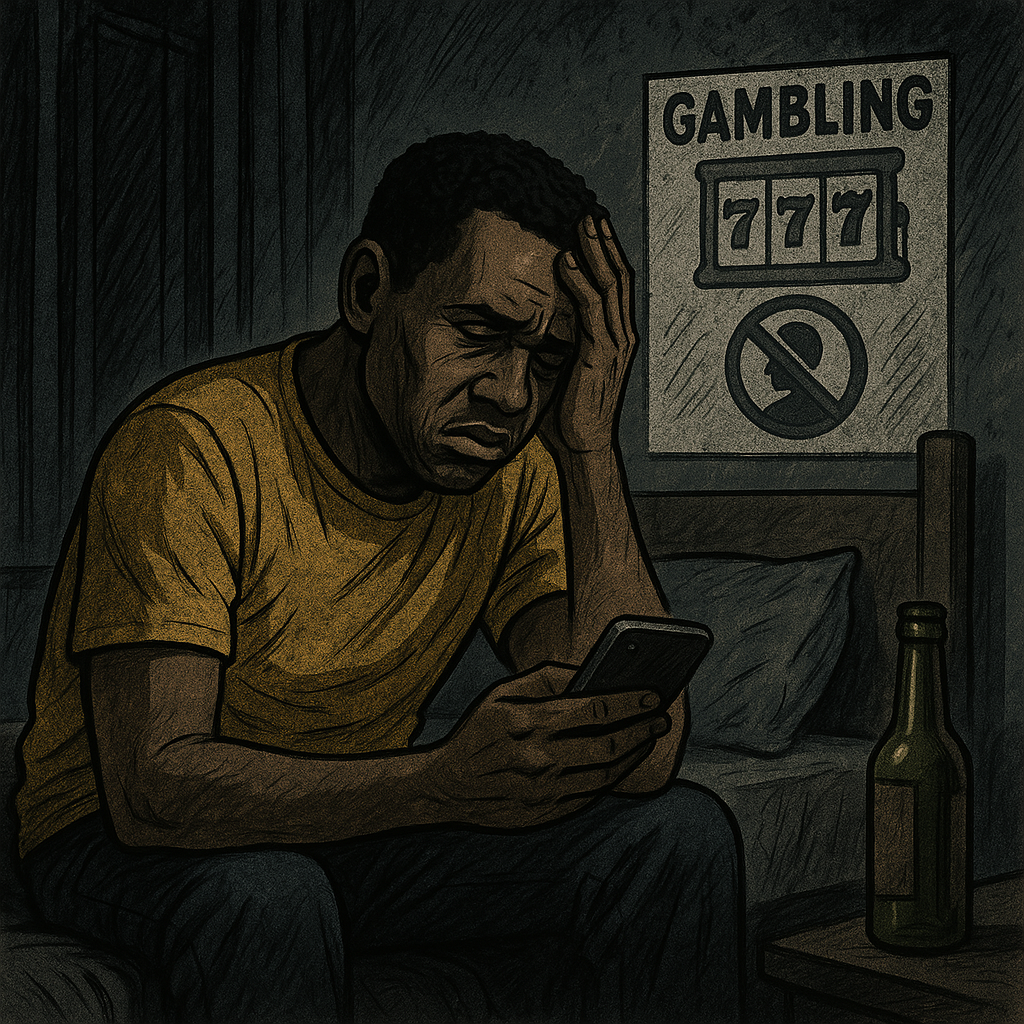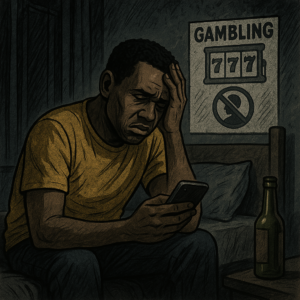The Dark Side: Addressing Gambling Addiction in African Communities
As sports betting and other gambling forms experience unprecedented growth across Africa, a parallel crisis has emerged that demands urgent attention from policymakers, healthcare providers, and the gambling industry itself. Behind the economic expansion statistics and revenue reports lies a troubling reality: a significant increase in gambling addiction that threatens the financial stability, mental health, and social cohesion of communities throughout the continent. Research conducted across major African gambling markets indicates approximately 4-6% of regular bettors develop clinically significant problem gambling behaviors, while an additional 12-15% show moderate risk patterns that may progress to addiction without appropriate intervention. These percentages translate to millions of affected individuals when applied to the estimated 30+ million active bettors across Sub-Saharan Africa alone. The human cost extends far beyond the affected individuals to impact families, employers, and broader community structures through financial hardship, relationship breakdown, reduced productivity, and in severe cases, connections to crime and suicide. Unlike more visible public health challenges, gambling addiction often remains hidden within communities—its symptoms disguised or misinterpreted, its consequences attributed to other causes, and its treatment needs largely unaddressed by existing healthcare systems. Understanding this growing crisis requires examining both universal addiction mechanisms and the unique contextual factors that shape gambling addiction’s manifestation across different African societies, creating the foundation for developing more effective prevention, identification, and treatment approaches tailored to the continent’s specific needs.
Understanding the Scale of Problem Gambling Across Africa
Accurately assessing gambling addiction prevalence across African markets presents significant methodological challenges, yet available research reveals concerning patterns that suggest substantial and growing public health implications. Developing this understanding requires examining both the emerging data landscape and the specific methodological considerations that shape our knowledge of problem gambling’s scope and impact throughout the continent.
Prevalence Patterns and Regional Variations
Research conducted across major African gambling markets demonstrates troubling prevalence rates of problem gambling behaviors, though significant regional variations reflect different market maturity levels, gambling availability, and sociocultural factors. Comprehensive studies in South Africa using validated screening tools like the Problem Gambling Severity Index (PGSI) indicate approximately 3.8-4.6% of the adult population meets clinical criteria for problem gambling, with an additional 15-18% falling into moderate risk categories. Kenyan research reports higher rates, with studies suggesting approximately 5.7-6.5% of adult urban residents demonstrate problem gambling behaviors, with particularly elevated rates among young men. Nigerian data shows similar patterns, with prevalence estimates of 4.2-5.3% for problem gambling and concerning concentration among younger demographics, with studies indicating almost 7% of urban males aged 18-35 demonstrate addiction indicators. Ghanaian and Ugandan studies, while more limited in scope, suggest comparable prevalence levels, indicating this challenge extends throughout various African gambling markets rather than remaining confined to specific regions. These prevalence figures significantly exceed rates reported in most mature gambling markets like the United Kingdom (0.7-1.2%) and Australia (1.5-2.3%), suggesting African communities face disproportionate vulnerability to gambling-related harm despite their markets’ relatively recent development. Longitudinal data, though limited, indicates these prevalence rates have increased substantially over the past decade, with Kenyan research documenting approximately 140% growth in problem gambling rates between 2010-2020, correlating directly with expanded gambling availability and reduced access barriers through mobile technology.
Methodological Challenges and Data Limitations
Accurately measuring gambling addiction prevalence across Africa encounters substantial methodological challenges that likely result in underestimation of the true problem scope. Research limitations begin with sampling difficulties—studies predominantly focus on urban populations with better research accessibility, potentially missing significant rural gambling participation that has expanded through mobile technologies. Screening tool validation presents another challenge, as most standard problem gambling assessment instruments were developed in Western contexts and may not fully capture culturally-specific manifestations of addiction behaviors across diverse African societies. For example, validation studies of the South Oaks Gambling Screen (SOGS) in Kenyan contexts revealed potential cultural biases in questions regarding hiding gambling from family members, which produced higher positive responses due to general privacy norms rather than addiction indicators. Self-reporting limitations further complicate prevalence assessment, with significant stigma surrounding addiction acknowledgment in many communities likely resulting in underreporting of problematic behaviors. Most concerning from a public health perspective is the severe limitation of clinical diagnosis data, as healthcare systems across most African nations lack standardized tracking of gambling disorders, creating significant gaps between research-based prevalence estimates and officially documented cases. These methodological challenges collectively suggest available prevalence figures likely represent conservative estimates of gambling addiction’s true scale across African communities, with actual harm potentially exceeding reported levels by substantial margins according to public health researchers specializing in addiction epidemiology.
Demographic Patterns and Vulnerable Populations
Research reveals distinct demographic patterns in African gambling addiction that differ somewhat from those observed in more mature markets, with important implications for targeting prevention and intervention efforts. Age distribution shows particularly concerning concentration among younger populations—approximately 70-75% of identified problem gamblers across major African markets fall within the 18-35 age range, with highest prevalence typically observed in the 21-28 bracket. This youth vulnerability creates particularly serious developmental implications as addiction impacts coincide with critical education, career establishment, and family formation periods. Gender distribution shows strong male predominance, with studies indicating males represent approximately 80-85% of problem gamblers across most African markets, though female participation in both gambling and problematic usage patterns shows increasing trends, particularly in Southern African markets. Socioeconomic vulnerability demonstrates complex patterns that defy simplistic correlation with poverty—problem gambling appears across diverse economic strata, though research indicates particularly concerning concentration among lower-middle income groups struggling for economic advancement rather than the poorest populations who lack disposal income for significant gambling participation. Educational patterns reveal interesting contradictions, with problem gambling rates often peaking among those with secondary education completion but limited tertiary education, suggesting knowledge sufficient to engage with gambling systems but potentially insufficient critical analysis of mathematical disadvantages. Occupational distribution analysis indicates elevated risk among those with irregular income patterns, including daily wage workers, commission-based sales positions, and informal economy participants whose unpredictable earnings patterns may increase vulnerability to gambling’s perceived opportunity for financial stability. Understanding these demographic patterns provides essential guidance for developing targeted intervention approaches that address the specific needs and characteristics of those most affected by gambling-related harm across diverse African communities.
Cultural and Socioeconomic Factors Influencing Addiction Patterns
The development and manifestation of gambling addiction across African communities reflects the complex interplay between universal addiction mechanisms and specific cultural, economic, and social factors that shape risk, vulnerability, and behavioral expression. Understanding these contextual influences provides essential insight for developing culturally appropriate prevention and treatment approaches.
Economic Vulnerability and Financial Motivations
The economic context surrounding gambling engagement in many African communities creates distinctive addiction risk factors that differ significantly from patterns observed in more affluent gambling markets. Research indicates approximately 60-65% of problem gamblers across major African markets cite financial motivation as their primary reason for gambling initiation and continued participation, compared to 30-35% in European markets where entertainment and social motivations typically predominate. This economic motivation intersects with widespread youth unemployment—with rates exceeding 50% in many urban centers—creating dangerous perception of gambling as potential income source rather than entertainment expenditure. Survey research from Nigeria, Kenya, and Ghana indicates approximately 45-50% of regular bettors report perceiving gambling as a viable financial strategy, with qualitative interviews revealing common characterization of betting as “investment” or “business opportunity” rather than risk-based entertainment. This economic framing creates particularly problematic cognitive patterns, with financial desperation driving continued participation despite mounting losses in attempts to recover previous expenditures. The relationship between financial vulnerability and problem gambling manifests through concerning cyclical patterns documented in longitudinal studies—initial gambling often begins with small stakes during periods of some financial stability, escalates during financial pressure as participants attempt to address shortfalls through increased betting, then accelerates further as gambling losses create additional financial pressure, establishing destructive reinforcement cycles. Economic inequality contextualizes this vulnerability, with the visible wealth disparity characteristic of many rapidly developing African economies creating aspiration gaps that gambling seemingly offers to bridge through potential immediate financial transformation, contrasting sharply with limited traditional economic mobility pathways available to many young Africans.
Cultural Attitudes Toward Risk and Chance
Traditional cultural perspectives regarding risk, fortune, and chance across diverse African societies influence how gambling behaviors develop and how problems are conceptualized within communities. Anthropological research identifies several cultural factors with significant implications for gambling behavior: fatalistic perspectives regarding fortune that frame outcomes as predetermined rather than probability-based; traditional practices involving chance-based decision-making that create cultural familiarity with risk concepts; spiritual beliefs regarding luck and blessing that may be transferred to gambling contexts; and traditional gender roles regarding financial risk-taking that influence participation patterns. These cultural perspectives interact with gambling industry messaging in complex ways—marketing frequently incorporates culturally resonant concepts like destiny, spiritual blessing, and prosperity through divine favor, effectively bridging traditional belief systems with commercial gambling participation. The interpretation of gambling outcomes similarly reflects cultural frameworks, with wins frequently attributed to skill, spiritual favor, or destiny fulfillment rather than statistical probability, creating reinforcement patterns that encourage continued participation despite mathematical disadvantage. Community-level attitudes regarding gambling demonstrate important regional variations—South African research indicates gambling problems often carry significant stigma hindering help-seeking, while West African studies show greater normalization of heavy gambling with fewer associated social sanctions. Religious perspectives add another layer of complexity, with Christian denominations demonstrating diverse positions from prohibition to acceptance, while Islamic communities generally maintain stronger normative sanctions against gambling, though with varying enforcement across different regions and traditions. Understanding these cultural dimensions proves essential for developing contextually appropriate messaging, prevention approaches, and treatment models that align with existing belief systems rather than contradicting established cultural frameworks.
Social Network Effects and Community Structures
The social embeddedness of gambling within African community structures creates distinctive influence patterns that shape both participation and potential progression toward problematic behavior. Unlike more individualistic gambling contexts common in Western markets, African gambling frequently occurs within robust social networks that simultaneously provide potential protective factors and risk amplification. Research from urban centers across major gambling markets indicates approximately 65-70% of regular bettors participate at least partially through social connections—friends placing bets together, colleagues forming betting pools, or community members gathering to watch and wager on sporting events. These social structures create complex influence dynamics: peer normalization can accelerate problematic behavior through competitive escalation and social pressure, yet these same networks potentially provide early warning systems when individual behavior exceeds community norms. The role of social spaces in gambling engagement demonstrates distinctive patterns across different regions—physical betting shops in West Africa function as significant community gathering points combining socialization with betting activity, while East African gambling shows stronger digital social organization through messaging platforms and social media groups focused on betting discussion. Family structure influences similarly demonstrate important impact pathways, with extended family financial interdependence creating broader harm distribution when individual gambling problems develop—studies indicate problem gamblers across various African markets typically affect 5-7 additional family members through financial strain, compared to 2-3 in nuclear family structures more common in Western contexts. Generational perspectives regarding gambling create additional complexity, with significant perception gaps between older community members who often view gambling with greater skepticism and younger participants who have normalized betting as standard entertainment, creating potential intergenerational tension when problems emerge.
Identifying Warning Signs and Vulnerability Indicators
Effective gambling harm reduction requires recognizing both universal addiction indicators and contextually specific warning signs that may manifest differently across African communities compared to settings where most clinical literature developed. Understanding these manifestation patterns provides essential guidance for early intervention before severe consequences emerge.
- Escalating stakes and increased betting frequency represent universal warning indicators, with progression from occasional recreational betting to daily engagement and steadily increasing wager sizes displaying particularly strong correlation with developing addiction across all studied African markets.
- Financial deception within family systems often manifests early in problematic gambling progression, with individuals concealing expenditure through elaborate explanation systems, hidden accounts, or intercepting family financial communications before other household members see betting-related transactions.
- Sleep pattern disruption shows strong correlation with developing gambling problems, particularly with individuals remaining awake during late night hours to place bets on international sporting events or virtual games, creating performance impairment in work and educational settings.
- Social isolation from previous non-gambling networks frequently accompanies deepening addiction, with individuals gradually withdrawing from family and community activities while simultaneously strengthening connections exclusively with other gambling participants who normalize problematic behavior.
- Digital behavior patterns provide increasingly valuable early warning indicators, with continuous checking of betting apps, obsessive score monitoring, and extended viewing of betting-related content demonstrated to precede more severe addiction manifestations in longitudinal studies.
Distinctive financial vulnerability indicators provide particularly important warning signs within African contexts, often manifesting before clinical addiction criteria emerge fully. Research across multiple African markets identifies several financially-focused behavioral patterns strongly predictive of developing gambling problems: liquidation of productive assets to fund betting represents a particularly concerning early indicator, with individuals selling business inventory, agricultural inputs, or work equipment to generate betting funds, effectively sacrificing income-generating capacity for gambling participation. Educational investment diversion shows similarly troubling patterns, with approximately one-third of student problem gamblers in Kenyan studies reporting using education fees or book money for betting activity. Financial responsibility avoidance within extended family systems often emerges early in problem development, with individuals becoming increasingly unreliable for expected contributions to household expenses, extended family support, or community financial obligations. Transaction pattern analysis reveals distinctive warning signs including increasing frequency of small withdrawals from mobile money systems immediately followed by betting deposits, midnight transactions coinciding with late-night gambling opportunities, and escalating usage of lending products with immediate transfer to betting accounts. These financial indicators prove particularly valuable for early identification because they typically emerge during transitional phases between recreational and problematic gambling, creating intervention opportunities before addiction becomes fully established. Financial institutions across several markets have begun developing monitoring systems that identify these patterns, though important ethical questions remain regarding privacy, autonomy, and appropriate intervention approaches when concerning patterns emerge.
Psychological and behavioral indicators in African contexts sometimes manifest differently than in settings where diagnostic criteria were developed, requiring culturally informed observation frameworks. Mood pattern shifts frequently accompany developing gambling problems, with heightened irritability during periods without betting access and temporary euphoria during gambling activity creating noticeable personality changes observed by family members. Sleep disruption demonstrates distinctive patterns across various markets—West African research highlights late night betting shop participation extending into early morning hours, while East African studies emphasize digital engagement with international events during overnight periods, particularly European football leagues and virtual events scheduled during night hours. Occupational and educational performance decline typically accompanies deepening gambling involvement, though attribution challenges often prevent recognition of gambling as the underlying cause, with fatigue, illness, or motivation problems frequently cited instead. Language pattern shifts provide subtle indicators, with increasing usage of betting terminology, preoccupation with gambling narratives, and conversation redirection toward betting topics even in unrelated social contexts. Relationship quality deterioration often accelerates as gambling problems develop, with increasing conflicts around financial issues, emotional unavailability during betting activities, and breakdowns in trust following discovery of concealed gambling behaviors. These psychological and behavioral indicators collectively create observable patterns that appropriately trained family members, employers, educators, and healthcare providers can potentially identify before catastrophic consequences emerge, though significant awareness gaps currently limit effective early recognition across most communities.
Existing Support Systems and Their Limitations
The infrastructure available to address gambling addiction across African communities demonstrates concerning inadequacy relative to the scale and severity of the challenge, with significant gaps in awareness, accessibility, and appropriateness of existing resources. Understanding these limitations provides essential context for developing more effective response frameworks.
Treatment Availability and Access Barriers
The landscape of specialized gambling addiction treatment across Africa reveals severe capacity limitations unable to address current need levels, with distribution patterns creating particular access challenges for affected populations. Specialized treatment resources demonstrate extreme scarcity—South Africa maintains the continent’s most developed services with approximately 35-40 dedicated gambling treatment professionals serving a population of nearly 60 million, while Kenya reports fewer than 15 specialists for over 50 million citizens, and many countries have no specifically trained gambling addiction treatment providers whatsoever. This shortage creates overwhelming capacity constraints, with waiting periods for specialized treatment frequently exceeding 2-3 months in urban centers and complete unavailability in rural regions. Geographic distribution creates additional access challenges, with available services heavily concentrated in major cities—approximately 80-85% of specialized treatment resources across studied African markets are located in primary urban centers, creating prohibitive travel requirements for rural populations seeking assistance. Economic barriers further restrict access, with treatment costs often exceeding affordability for affected individuals who typically face financial distress resulting from their gambling problems. Insurance coverage for addiction treatment shows significant limitations across most African healthcare systems, with gambling disorders frequently excluded from mental health coverage or mental health benefits absent entirely from available insurance programs. These systemic limitations result in treatment reaching only a tiny fraction of those experiencing gambling-related harm—research estimates fewer than 1% of individuals meeting clinical criteria for gambling disorder across major African markets currently receive specialized treatment, creating enormous unaddressed need as gambling participation continues expanding through increased availability and reduced access barriers.
Awareness Deficits and Stigmatization
Knowledge gaps regarding gambling addiction’s nature, progression, and treatability create fundamental barriers to addressing the growing crisis across African communities. Public awareness research reveals concerning deficits—surveys across multiple African markets indicate approximately 65-70% of respondents could not identify basic warning signs of problematic gambling, while nearly 60% expressed belief that gambling addiction represents personal weakness or moral failing rather than treatable health condition. These misconceptions extend into professional contexts, with studies documenting significant knowledge limitations among healthcare providers, social services personnel, and religious counselors likely to encounter gambling problems through their work, compromising detection and appropriate referral. Mental health stigma creates additional barriers, with gambling problems considered shameful in many communities, preventing open discussion and help-seeking behavior. Religious frameworks sometimes reinforce these stigmatizing perspectives, with gambling problems frequently framed as spiritual or moral failings requiring prayer or repentance rather than treatment intervention, particularly within certain Christian denominations and Islamic communities where gambling itself carries religious prohibition. Language and conceptual frameworks present additional communication challenges—many African languages lack specific terminology for addiction concepts developed in Western clinical contexts, creating translation difficulties for both public education and therapeutic communication. These awareness and stigma barriers collectively contribute to treatment delays, with research indicating average time between problem development and help-seeking exceeding 3-4 years across studied African populations, allowing significant harm accumulation before intervention occurs. Recent awareness initiatives demonstrate promising approaches—South Africa’s National Responsible Gambling Programme has pioneered culturally appropriate messaging that frames gambling problems within mental health contexts while addressing specific local misconceptions, providing potential models for adaptation across other African markets facing similar awareness challenges.
Regulatory Frameworks and Industry Responsibility
The regulatory environments governing gambling providers’ responsibilities toward customer protection vary dramatically across African jurisdictions, creating inconsistent safeguards against addiction development and progression. Responsible gambling requirements demonstrate significant variation—South Africa’s regulatory framework includes comprehensive operator obligations including mandatory self-exclusion programs, staff training for problem identification, on-site information requirements, and contribution to treatment funding, while many other jurisdictions maintain minimal or unenforced provisions despite similar gambling availability. Implementation quality shows further inconsistency, with theoretical requirements often undermined by limited monitoring, inadequate enforcement capacity, and regulatory capture concerns in markets where gambling taxation represents significant government revenue. Self-exclusion programs—allowing individuals to ban themselves from gambling participation—demonstrate particular implementation challenges, with multi-operator systems largely absent across most African markets, creating situations where excluded individuals can simply move to different providers. Advertising regulations show similar limitations, with many jurisdictions lacking effective restrictions on messaging targeting vulnerable populations or implying gambling as financial solution, creating environmental conditions conducive to problem development. Industry funding for treatment and prevention represents another critical gap—while mature gambling markets typically require operators to contribute 0.5-2% of revenue toward harm minimization programs, most African jurisdictions lack such requirements or maintain voluntary systems with limited participation. These regulatory limitations create environments where gambling expansion significantly outpaces development of corresponding protection mechanisms, with public health considerations frequently subordinated to revenue generation objectives. Recent regulatory developments show some promising directions—Ghana’s Gaming Commission has introduced strengthened operator requirements including mandatory staff training, Kenya has implemented advertising restrictions limiting certain messaging approaches, and Nigeria’s federal government has begun developing national standards for responsible gambling measures, suggesting gradual movement toward more robust protection frameworks despite significant continuing limitations.
Building Effective Prevention and Treatment Frameworks
Addressing gambling addiction effectively across African communities requires developing comprehensive, culturally appropriate approaches that respond to the specific challenges and contextual factors shaping problem development and recovery. Several promising directions demonstrate potential for more effective responses to this growing public health concern.
Culturally Adapted Treatment Models
The development of treatment approaches specifically designed for African contexts represents a critical priority for addressing gambling addiction more effectively than current imported models permit. Cultural adaptation of evidence-based approaches shows promising results in limited implementation settings—cognitive-behavioral therapy protocols modified to incorporate relevant cultural concepts, family structures, and economic realities have demonstrated improved engagement and outcomes in South African clinical settings compared to unadapted Western models. These adapted approaches integrate several important modifications: incorporation of extended family in treatment processes rather than focusing exclusively on individual therapy; addressing financial recovery within collective responsibility frameworks common in many African communities; integrating appropriate spiritual elements where relevant to client belief systems; and utilizing culturally resonant metaphors and examples that improve concept accessibility. Group-based interventions demonstrate particular promise given their alignment with communal problem-solving approaches familiar in many African cultures, with pilot programs in Kenya showing approximately 30% higher completion rates for culturally-adapted group treatment compared to individual therapy models. Technology-assisted treatment options offer significant potential for addressing access limitations, with preliminary studies of mobile-delivered gambling interventions showing encouraging engagement among younger participants who might resist traditional clinical settings. Several innovation approaches show particular potential for broader implementation: South Africa’s problem gambling telephone counseling service provides remote access transcending geographic limitations; Kenya’s integration of gambling treatment into existing substance abuse recovery programs leverages limited clinical resources more efficiently; and Ghana’s peer support network development creates accessible community-based resources requiring less specialized professional involvement. While developing truly African treatment models remains an ongoing process requiring significant research investment, these adaptation efforts demonstrate meaningful progress toward more effective approaches aligned with the cultural, economic, and social realities shaping both addiction development and recovery across diverse African communities.
Prevention Strategies and Early Intervention
Preventing gambling problems before they develop represents the most cost-effective approach to reducing harm, with several promising strategies demonstrating potential for African contexts. School-based education programs specifically addressing gambling risks show encouraging results where implemented—South Africa’s teen awareness curriculum covering gambling mathematics, risk recognition, and financial literacy has demonstrated approximately 30-40% reduction in problematic gambling beliefs among participating students compared to control groups. These educational approaches prove most effective when incorporating culturally relevant examples, addressing specific local gambling forms, and focusing on practical skills rather than abstract concepts or simple prohibition messaging. Community-based prevention programs leveraging existing social structures demonstrate similar promise—religious organizations, sports clubs, and community associations provide natural intervention points for delivering prevention messaging through trusted channels with established credibility. Digital literacy components have emerged as particularly important given online gambling’s rapid growth, with programs teaching critical evaluation of gambling advertisements, understanding of odds manipulation, and recognition of exploitative design features showing improved resistance to problematic digital gambling engagement. Economic empowerment integration represents another innovative approach, with several programs combining gambling harm prevention education with practical financial management skills, legitimate income generation training, and microfinance opportunities, addressing underlying economic motivations driving risky gambling behavior. Early intervention systems demonstrate significant potential for limiting harm progression—brief screening and intervention protocols implemented in primary healthcare settings, university counseling services, and financial institution touchpoints have shown approximately 15-20% reduction in gambling escalation among at-risk individuals identified through these systems. These prevention and early intervention approaches complement treatment services by reducing overall problem development while identifying difficulties at earlier, more responsive stages before severe addiction manifestation occurs, creating more balanced harm reduction ecosystems than treatment-focused approaches alone can provide.
Policy Reforms and Stakeholder Engagement
Sustainable solutions to gambling addiction challenges require coordinated policy approaches engaging diverse stakeholders beyond healthcare systems alone. Regulatory reforms show significant potential for reducing problem development through evidence-based restrictions on gambling availability and design—mandatory pre-commitment systems requiring players to set loss limits before gambling, prohibition of continuous games with minimal reflection periods, restrictions on credit-based gambling, and limitations on high-intensity gaming machine characteristics have demonstrated harm reduction impact where implemented. Advertising regulations represent another critical policy area, with restrictions on promotion timing, content limitations preventing portrayal of gambling as financial solution, and mandatory warning message requirements showing protective effects in markets with such restrictions. Financial sector engagement offers promising intervention opportunities—partnerships with banking institutions to identify problematic transaction patterns, develop gambling-specific blocking tools for payment cards, and provide financial counseling integration with addiction services create protection mechanisms at critical transaction points. Operator accountability frameworks demonstrate important potential for aligning industry incentives with harm reduction objectives—licensing requirements tied to responsible gambling performance metrics, mandatory contribution to treatment and prevention funding proportional to revenue, and escalating penalties for violations of protection requirements have shown promising results in jurisdictions implementing such approaches. Technology-based solutions warrant significant investment—centralized self-exclusion registries operational across all licensed operators, mandatory identity verification preventing underage access, and player tracking systems identifying problematic patterns before severe harm develops represent technological approaches with demonstrated effectiveness. These policy directions require balanced implementation acknowledging both legitimate entertainment value for recreational participants and necessary protections for vulnerable individuals, developing frameworks that permit responsible industry operation while establishing meaningful guardrails against exploitative practices that generate preventable addiction cases and associated social costs.
The Path Forward: Balancing Industry Growth with Public Health
Developing sustainable approaches to gambling addiction across African communities requires recognizing the legitimate economic dimensions of the gambling industry while establishing adequate safeguards to protect public health and social welfare. This balanced perspective acknowledges both potential benefits and demonstrable harms while seeking evidence-based approaches to maximize positive outcomes while minimizing negative consequences.
Sustainable Industry Models and Shared Responsibility
The long-term viability of Africa’s gambling sector depends on developing operational models that support economic benefits while incorporating meaningful responsibility frameworks that prevent industry growth from generating proportional increases in gambling-related harm. Evidence from mature gambling markets demonstrates that sustainable approaches typically incorporate several key elements: reasonable taxation levels that support government services without creating dependency on gambling revenue that might compromise regulatory independence; mandatory reinvestment of specified revenue percentages (typically 1-3%) in harm prevention, treatment, and research initiatives proportional to market size; operator licensing requirements that include demonstrated capability to identify and address problematic customer behavior; and independent regulatory bodies with consumer protection mandates separate from revenue generation objectives. Responsibility distribution requires appropriate allocation across stakeholders—government bodies establish and enforce regulatory frameworks; operators implement protection systems and fund harm reduction initiatives; health systems develop appropriate treatment responses; financial institutions incorporate transaction monitoring and restriction capabilities; and community organizations participate in awareness and prevention activities. This shared responsibility model avoids placing unrealistic burden on any single stakeholder while ensuring coordinated response to gambling harm across relevant sectors. Industry sustainability measures demonstrate important benefits beyond harm reduction—Australian research indicates gambling operators implementing comprehensive responsibility measures typically demonstrate better long-term financial performance through improved customer retention, reduced regulatory intervention risk, and stronger brand reputation compared to competitors prioritizing short-term revenue maximization through exploitative practices. South Africa’s experience provides valuable reference for other African markets, demonstrating how established responsibility frameworks can operate alongside viable commercial gambling operations when appropriate balance mechanisms maintain focus on both economic and public health considerations rather than subordinating either dimension.
Research Priorities and Knowledge Development
Addressing gambling addiction effectively across African communities requires substantial investment in context-specific research addressing significant knowledge gaps regarding prevalence, manifestation patterns, effective interventions, and prevention approaches. Priority research directions include developing and validating culturally appropriate screening instruments that accurately identify problem gambling within diverse African contexts without inappropriate application of Western behavioral norms or assumptions; conducting representative prevalence studies across different regions, age groups, and socioeconomic categories to establish accurate baseline understanding of problem scope and distribution; investigating specific vulnerability factors operating within African contexts that might differ from those identified in existing literature from other regions; developing and testing prevention and treatment approaches specifically designed for African cultural, economic, and social environments rather than simply importing models developed elsewhere; and examining long-term consequences of gambling problems within extended family systems and community structures characteristic of many African societies. Methodological approaches warrant particular attention, with participatory research models that engage affected communities as partners rather than subjects showing promise for developing more relevant and applicable knowledge. Funding mechanisms for this research agenda require careful consideration—models that maintain investigator independence while leveraging industry financial contributions through intermediary organizations have demonstrated effectiveness in other regions, preventing both resource limitations and potential conflicts of interest that might compromise research integrity. Knowledge translation represents another critical consideration, ensuring research findings move effectively from academic contexts into practical applications through appropriate dissemination to policymakers, treatment providers, prevention specialists, and affected communities in accessible formats that facilitate implementation. Several encouraging research initiatives have recently emerged—the University of Cape Town’s Problem Gambling Research Unit provides valuable regional leadership, while collaborative projects between African institutions and international research centers offer opportunities for knowledge exchange while maintaining contextual relevance.
Integration with Broader Mental Health and Development Frameworks
Addressing gambling addiction effectively requires positioning these efforts within broader mental health systems and development frameworks rather than treating gambling problems as isolated phenomena disconnected from other health and social priorities. Mental health integration offers significant advantages—incorporating gambling addiction into developing mental health systems leverages limited specialist resources more efficiently, reduces stigma through normalized healthcare framing rather than moral failing perspectives, and addresses common comorbidities including depression, anxiety, and substance use that frequently accompany gambling problems. Several promising integration models have emerged across different African contexts: Kenya’s incorporation of gambling screening within general mental health assessments at primary care level; Nigeria’s training program equipping existing mental health professionals with gambling-specific knowledge; and South Africa’s integrated addiction services addressing substance and behavioral addictions through unified approaches rather than separate treatment tracks. Development framework integration similarly offers important opportunities—recognizing gambling harm’s relationship with poverty reduction objectives, social welfare programs, financial inclusion initiatives, and youth unemployment challenges allows coordinated responses rather than competing priorities. The sustainable development goals provide natural connection points for gambling harm reduction efforts, particularly regarding poverty reduction, health system strengthening, and economic opportunity expansion. This integrated perspective encourages viewing gambling addiction not as isolated public health challenge but as component within interconnected social and economic systems requiring coordinated response across multiple sectors. Positioning gambling harm reduction within these broader frameworks helps ensure these issues receive appropriate attention within national priority-setting processes while avoiding siloed approaches that fail to address underlying factors or leverage existing systems that could provide intervention opportunities despite resource limitations across many African contexts.
As Africa’s gambling industry continues its rapid expansion driven by technological accessibility, market liberalization, and changing entertainment preferences, addressing the parallel growth in gambling addiction represents an urgent priority requiring coordinated action across multiple stakeholders. The path forward must balance legitimate economic activity with necessary public health protections, developing approaches that acknowledge gambling’s entertainment value for responsible participants while establishing adequate safeguards for vulnerable individuals and communities. This balanced perspective requires moving beyond simplistic prohibition versus promotion dichotomies toward evidence-based policies that maximize benefits while minimizing harms through appropriate regulation, prevention, early intervention, and treatment options adapted to African cultural and economic realities. The significant human costs of unaddressed gambling addiction—financial devastation, family breakdown, employment disruption, and psychological distress—demand more comprehensive responses than currently exist across most African jurisdictions, particularly given the disproportionate impact on younger populations whose productive potential represents critical social and economic value. By developing more effective approaches to this growing challenge, African societies can ensure gambling industry development contributes positively to economic growth and entertainment diversity without generating preventable social costs that undermine broader development objectives or harm vulnerable community members through addiction consequences that extend far beyond individual gamblers to affect families, employers, and communities throughout the continent.











